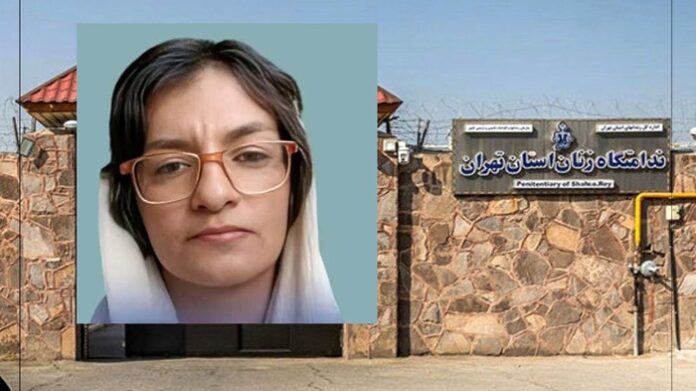The Iranian regime has once again revealed the depths of its cruelty with the state-sanctioned murder of political prisoner Somayeh Rashidi. On Thursday, September 25, 2025, the 42-year-old activist died in the notorious Qarchak Prison, not from an illness, but from the regime’s deliberate and criminal denial of medical care. Her death is a tragic but clear indictment of a long-standing policy in which medical treatment is withheld as a weapon to torture and eliminate political opponents.
This is a calculated crime. The authorities at Qarchak Prison were fully aware of Somayeh’s deteriorating condition and consciously chose to let her die, turning her prison cell into a death chamber.
A worker punished for dissent
Somayeh Rashidi was a 42-year-old garment worker who had suffered from epilepsy for many years. Her only “crime” was daring to demand freedom for her people. She was arrested on April 28, 2025, after writing anti-government slogans in a poor neighborhood in southern Tehran. Confirming her death, Mizan, the news agency of the regime’s judiciary, wrote that she “was arrested in 2022 and 2023 on charges of connection with the PMOI, but six months after conditional release, she reestablished contact with the PMOI and was arrested again on April 28, 2025”
From the moment of her arrest, she was subjected to the regime’s brutality. Her relatives confirmed she was savagely beaten, with officers slamming her head against a wall. This initial violence was a prelude to the slow-motion execution that would follow inside the prison walls.
A chronicle of calculated cruelty
Inside Qarchak Prison, Somayeh’s pre-existing epilepsy became a tool for her torturers. Her cellmates witnessed her repeatedly suffering from seizures and severe headaches, but her pleas for medical help were systematically ignored. Mirza Baqi, the supposed prison doctor who is in reality a torturer tasked with legitimizing the regime’s crimes, callously dismissed her life-threatening condition as “feigning illness” and “malingering.” Instead of providing proper treatment, authorities gave her neurological drugs unrelated to her epilepsy.
On September 16, after suffering a severe seizure, she was finally transferred to a hospital, but only after a prolonged and criminal delay. By then, it was too late. Doctors described her condition as “critical,” with her level of consciousness dropping to a level with no prospect of recovery. The NCRI Women’s Committee had publicly warned on September 21 that her life was in imminent danger, but the regime ignored the alarm. In a final act of psychological warfare, state-run media outlets blamed her family for “refusing” to post bail, a vicious lie her cellmates confirmed was due to their inability to afford the sum.
Not an isolated incident: a systematic policy of murder
Somayeh’s death is not an anomaly; it is the direct outcome of the regime’s systematic policy of using medical neglect as an extrajudicial weapon. Her murder is part of a horrifying pattern. Just days before her death, two other female prisoners died under nearly identical circumstances. On September 19, Jamileh Azizi died in Qarchak Prison after her heart attack symptoms were ignored. One week earlier, on September 12, Maryam Shahraki died in Fardis Prison after being given a few pills for severe chest pain and sent back to her ward.
These are not coincidences. This is a deliberate strategy employed by the clerical regime to break the spirit of resistance and silently eliminate its opponents, all while maintaining a façade of deniability.
The blood of Somayeh Rashidi is on the hands of Ali Khamenei and the entire apparatus of his criminal regime. They are directly responsible for this heinous crime, and they will be held accountable for this and numerous other crimes they committed against the people of Iran.
In this regard, the international community has a responsibility to move beyond condemnation and take concrete action. In a statement following the death of Somayeh Rashidi, the National Council of Resistance of Iran (NCRI) called on the United Nations Special Rapporteur to “investigate the circumstances of Somayeh Rashidi’s death and the crime of the vile clerical regime” and urged the UN High Commissioner for Human Rights, the Human Rights Council, the Special Rapporteur on Iran, and the Special Rapporteur on Violence Against Women to take “urgent action to save the lives of sick prisoners, especially women, in the Qarchak torture center.”


